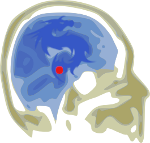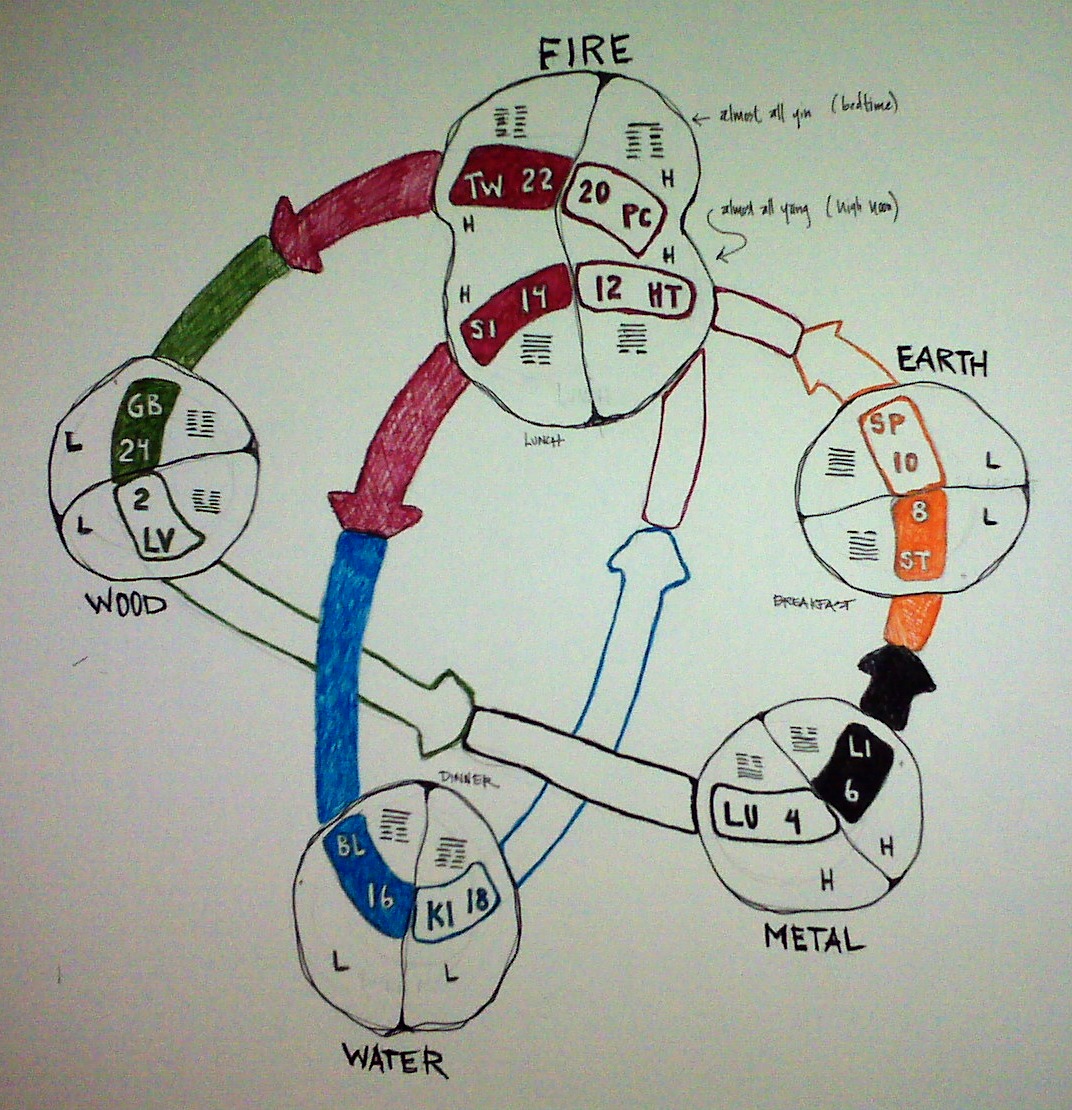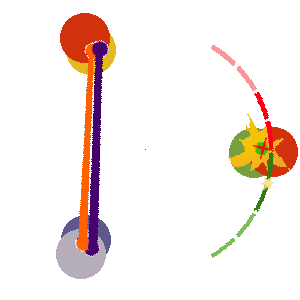
I want to introduce the work and interesting patterns I have been finding in Traditional Chinese Medicine and in particular it's way of describing the way that energetic systems of the body change in time.
The Diurnal Cycle 101: a quick crash course
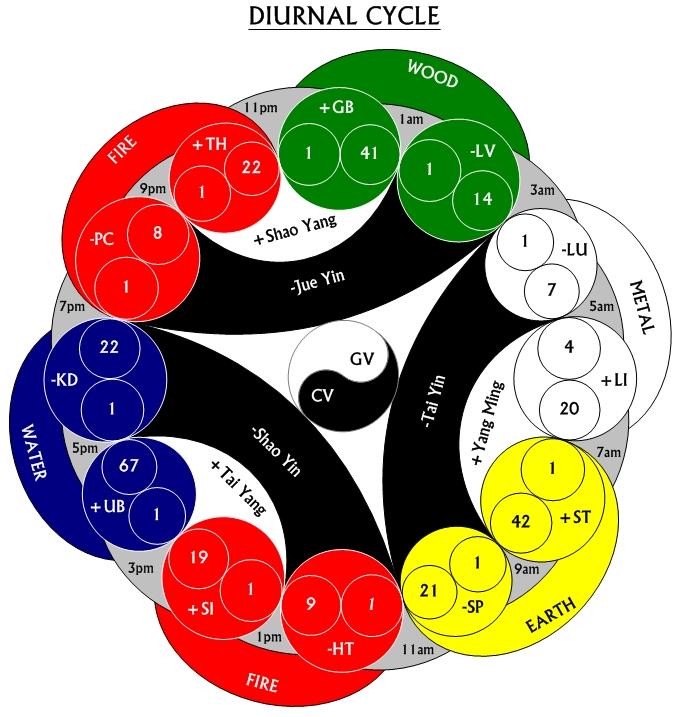
The diagram used to describe the daily transfer of energy throughout the body (or the Diurnal Cycle) is illustrated most often as a circle in which a trip around the circumference of the circle counts a day in time.
In Chinese medicine, there are 12 meridians in the body and 2 'vessels' which are like meridians but are special: instead of terminating or starting at the hands/feet (like the other 12), these 'vessels' actually begin at the head or genital region and travel through the navel in the front (the Conception Vessel) or down the back along the spine (the Governing Vessel).
All meridians/vessels fall along lines of energy that exist in the body, and have specific points along those lines (in medical science - c6 nerve bundles) that are used in acupuncture to treat illness.
Each day a measurable point of heat energy travels through each of the 12 main meridians one by one in the same order every day.
The Diurnal Cycle diagram illustrates how energy travels through each meridian in order and in time throughout a day, and which associated 'Channels' are subsequently energized or engaged in the process. In this illustration, time moves around symbolic ball-like representations of meridian pairs strung like beads around the circle. These beads are color coded to represent the 'Element' that governs each meridian and yin/yang pairing of meridians.
The 'Elements' are: Fire, Water, Wood, Metal and Earth. Each of the 12 meridians is associated with an Element. Each element has certain characteristics and so the meridians that are associated with each element shares those characteristics. There are 12 Meridians and 5 Elements, and so one of those Elements is used twice (Fire) meaning that 4 Meridians (or 2 meridians pairs) are associated with the Fire Element.
Each pair of meridians contains one Yin meridian (Yin is associated with water) and one Yang meridian (associated with Heat/Energy) which also have characteristics that are shared between other yang or yin meridians.
'Channels' are represented as three pairs of inverted black/white arcs between certain meridians. They engage and relate to specific meridians and are activated at various times of the day.
In the center are the Governing and Conception vessels illustrated as a yin/yang at the very center. These will all become more relevant later.
The Main Questions
So...I'm learning about these as well the individual acupuncture points (which I also conducted a whole other study around), and I start to get a bunch of questions - some of which have not been answered by books or any of the folks I've asked. Questions like:
- Why is the Fire element the only one shared by two meridian pairs?
- If the channels take up so much space in these diagrams, why do they not take a similar amount of space in my text books. In other words, why is there not more information about the dynamics of how they function?
- Why are the Conception Vessel and Governing Vessel at the center of the diagram in a ying/yang symbol?
- What does a Channel really look like and how does it work?
- Did the Traditional Chinese Medicine sages of old know that we have a real live flux capacitor (it's what makes time travel possible) in our bodies? This is partly a joke, but only because 'time travel' is not necessarily about getting in a vehicle and going sometime/somewhere.
Those last two questions especially are like those fundamental and fundamentally stumping questions that a 2 year old might ask. They may be asked in a light tone, but they are posited very seriously.
My Approach
My starting point was the diagrams themselves. These diagrams are ancient and are passed down to us as part of the wisdom tradition. In my mind, a tradition that is worthy is partly measured by the degree to which it's diagrams can support and communicate a matrix of the full idea.
Traditional Chinese Medicine (TCM) in my mind is one such tradition.
Unlike a typical schooled Doctor of Oriental Medicine, my bias is to perform thought experiments using the logical relationships between the objects in the diagrams themselves. In addition to the model above, I was also using the diagram of the 5 Elements which is often pictured together with the diagram of the Diurnal Cycle as in this picture below:
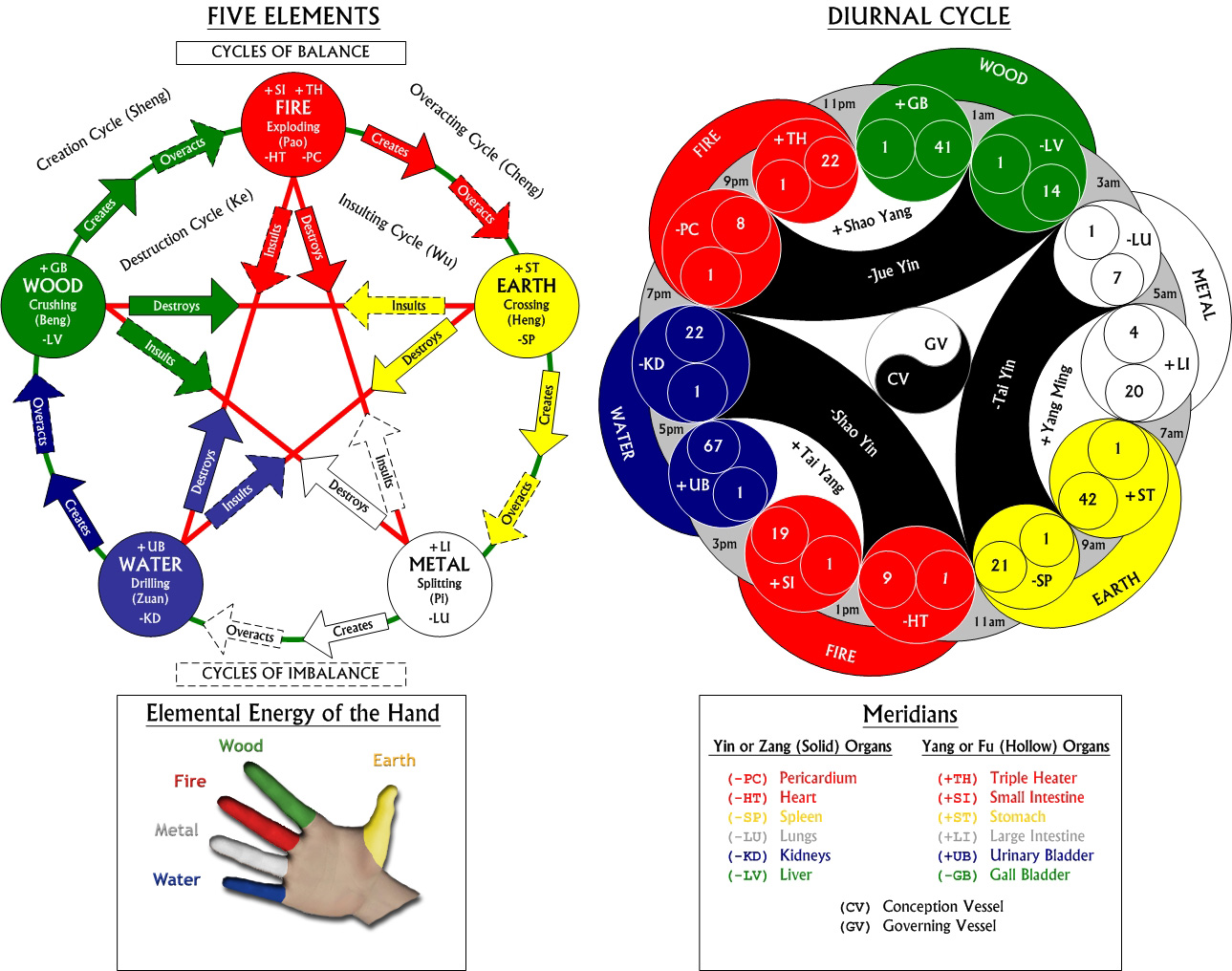
You don't need to know anything about any of this to get what I am saying.
My salient point being that this puzzle could be framed as a word puzzle or a color puzzle or a geometric puzzle. The ability to understand the approach I use in answering some of the initial questions posed at the beginning of this blog, you require nothing more than: 1) the ability to see the diagram itself, and 2) the ability to surmise that there are categories of phenomenon in the system described by the diagram which relate in the ways described.
You must be willing, as I was, to look at these puzzles as if they were something I already know, and just need to remember how I solved them before. The certainty that I have already solved something in the future increases the likelihood that I will persevere through this temporally induced lapse of memory.
You must also be willing to trust the fractal/wisdom of the diagram. This is big. These diagrams are old and have been around for a very long time. They are much smarter than I am, and I must be willing to give up thinking I know in order to really see these diagrams for all the wisdom they offer.
Generally speaking, when I study systems that exhibit definite patterns, solving for the ways in which the patterns seem out of alignment or off can often lead to the discovery of additional layers/systems of information or patterns of correlation. In this way, these patterns are hinted towards, but their immediate expression is not able to co-exist in the diagram as drawn in a way that is prime.
My Starting Bid
I let's start this journey with these two observations:
- The first is that, in the diurnal cycle and system of in which there are 6 parings of meridians, 2 of those pairings belong to the 'Fire' element (the only case in which this happens), and
- the 'vessels' are always drawn as a separate circle in the middle represented as a yin/yang symbol.
In order to satisfy my own curiosity, I redrew the two diagrams as one diagram. In other words, I pretended that I was visiting points on the 5 Element Star in their order as expressed by the diurnal cycle. It came out looking to me like two things: 1) a 2-stroke engine, and 2) representations I have seen of a mathematical 'Torus' – which has been described as a representation of the impression that the 4th dimension (often referred to as 'Time') leaves on the 3rd dimension.
These were exciting correlating patterns to find, namely because they all are different ways that science has found to represent the passage of time. One found/described in a mathematical language, and the other in a diagram describing the dance of energy through the human body over time.
These initial graphical explorations definitely peaked an interest, and seemed to just create more questions.
Which brings us to the passage in this thought experiment that is the most difficult to describe in a linear way, and at the same time, in my mind, the most inspired.
Making time stand still
In all of the representations of this cycle, time is expressed by movement around the diagram. The meridian that is activated at 3 AM is connected by a line to the one that activates at 5AM, and so '5 AM' is shown at a different point on the page than '3 AM'.
I wanted to see what these phenomenon would look like if time were standing still and the meridians were moving. Instead of seeing what these systems look like from the perspective of the 2nd (as with a 2D Diagram) or 3rd dimension (as with a 3D model of the body), I wanted to understand what these energetic systems would look like from the perspective of the 4th dimension.
But how?
Getting deeper into the pattern

You can't just play god and make things move around one another without reason. When taking great leaps into an unexplored realm, it's nice to have a sort of map or a sense of existing derived conventions or patterns that would indicate a direction of movement. In the problem of making time stand still in this diagram, it's not necessarily just a matter of creating a film/video/cartoon in which all of the meridians 'balls' of the diagram would turn like a wheel about the singular point of time.
In order to understand those derived movements, we must turn again to the original diagram.
Commutator
If you notice the diagram of the diurnal cycle, there are two meridians paired in the center (the Governing Vessel and the Conception Vessel) and drawn as a yin/yang symbol. To me, they also looked like a 'commutator' in an electrical engine. Since the system we are speaking of is essentially electrical, this did not seem to be accidental and the analogy seems legitimate.
A 'commutator' is used to change polarities of magnets in an engine such that the engine rotates. It changes the polarities of certain elements inside the engine in such a way that causes them to attract or repel the other elements and in that way creates rotation.
So the diagram itself seemed to be indicating the idea or possibility that 'rotation' in this system was in part being somehow generated by the attraction and repulsion of the energetic values of meridians that shift over time and as directed by the Governing and Conception vessel meridians. Practically for people who perform acupuncture it would mean that activation of certain channels can be maximized at certain times of the day in the same way that activating meridians at a certain time of the day is. It might also mean that treatment for a given 'channel' dysfunction might optimally change depending on the time of day and especially if any of the additional points being used were Conception or Governing Vessel points.
To make matters more interesting and consistent within this model, the travel of energy through the meridians of the body oscillates from energizing or traveling through a yin/yang pairing of arm meridians, through the center of the body (where the Conception/Governing vessels are), and then to a yin/yang pairing of leg meridians, and back and forth like that in an endless loop.
So for a moment, image you have three arms extended in the air (representing the three arm meridian pairs) and three legs touching the earth (representing the three leg meridian pairs). In the center of your body, you have a Governing vessel meridian traveling up and down your back, and another Conception vessel meridian traveling up and down the front of your torso. Six times a day, a point of energy flows between these two central 'commutator' body meridians when it flows from one of the 3 arm meridian pairs to one of the 3 leg meridian pairs and back and forth and back and forth...
Channels
'Channels' in traditional Chinese medicine are energetic connections between specific meridians. The indication/idea from the diagram is that each yin/yang pair of leg meridians is energetically connected to one yin/yang are meridian pairing.
So for example, if you look at the Diurnal Cycle diagram, you will see that there is a big semicircular path of black, inside the circle of a day, that connects the 'Earth' yin leg 'Spleen' meridian with the 'Metal' arm yin 'Lung' meridian, and a corresponding white semicircular path that connects the 'Earth' yang leg 'Stomach' meridian with the 'Metal' yang arm 'Large Intestine' meridian. Metal Arm to Earth Leg. Fire Arm to water leg. Fire Arm to Wood Leg. And then it starts over at Metal Arm to Earth Leg. Once a day.
These channels are seen as a protective force that acts almost as a first line of defense against pathogenic or external influences. Once the channels are filled up, the theory describes the ways in which these channel based influences are manifested in the energy and physical body of a human: maybe you'll develop phlegm in your nasal passages and a slight fever, maybe the ringing in your ears will become more pronounced and your joints will ache.
What I noticed about the 'channels' is that no one could ever describe to me how they worked – which to me means that the 'pattern' of what a channel is and how it functions is not really being uncovered in the memorizing of how to identify channel patterns.
The other thing I noticed about them is that they dance when represented the new model I have been teasing out in my research. In fact, they act exactly as you imagine a protective force field would.
But I'm getting ahead of myself. We still need to figure out how these buggers move.
Well, after staring at the different drawings diagrams that I had been creating for probably over 200 hours, I started seeing something that I found interesting. What I started seeing was that in each grouping of meridian pairs connected by channels, the yang pairs each exist on the same degree of yang, and the yin pairs each exist at the same degree of yin.
Let's take the pairing of Fire arm meridians that are activated mid-day (Heart to Small Intestines) which connect with the adjacent pair of Water leg meridians that would take us into early evening (Bladder to Kidney). The yang meridians from each arm or leg pair are both considered as the least yang of the yang meridians. Conversely, the yin meridians from each arm and leg pair are each considered to be the ones that are most yin. This consistency follows throughout the set, but what is interesting is that they grow in different directions.
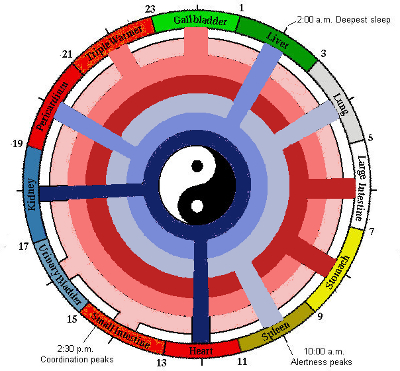
This version of the Diurnal Cycle demonstrates these gradients well. You will notice, extending our example above, that the Kidney and Heart meridians are connected with a dark blue channel which represents it as the most 'yin' of the yin channels. At the same time, the Bladder and Heart meridians are both connected by the least 'yang' of the yang channels.
The strange thing was that the severity or degree of 'yang' in a channel starts low in the early evening (connecting the Bladder and Small Intestines) and then increases as we wind down and sleep where it then peaks in the early morning with the channel connecting the Large Intestine with the Stomach meridians. Conversely, the degree of yin a yin channel seems to peak in the late afternoon with the channel connecting the Kidney and the Heart meridians, and it seems to get spent over the course of the evening until we arrive at the Lung and Spleen meridian channel activating in the early morning which is considered the least yin of the yin channels.
These gradients move in opposite directions.
Another way of looking at this is to go back to our analogy of having 3 legs and three arms. In this system, the severity or degree of yang channels moves in a circle in one direction for your legs and in the opposite for your arms. Like a double toroid in the systems you describe in your work, spinning in different directions and creating something special in the process.
At this point, I started reviewing and re-reading some of your work on the underlying geometry of the universe and think that these must somehow extend to the living energetic systems with in it as well. I was starting to see similarities in the behavior of these energetic principles that I was finding and the properties of a double toroidal vortex dynamic and the geometry of a black hole as you described in the process of having found the correct size of a proton. (congratulations, btw!)
So I decided to follow that model through. I first came up with a 2D version that does not move but that describes the positioning and movement of the meridian pairs:
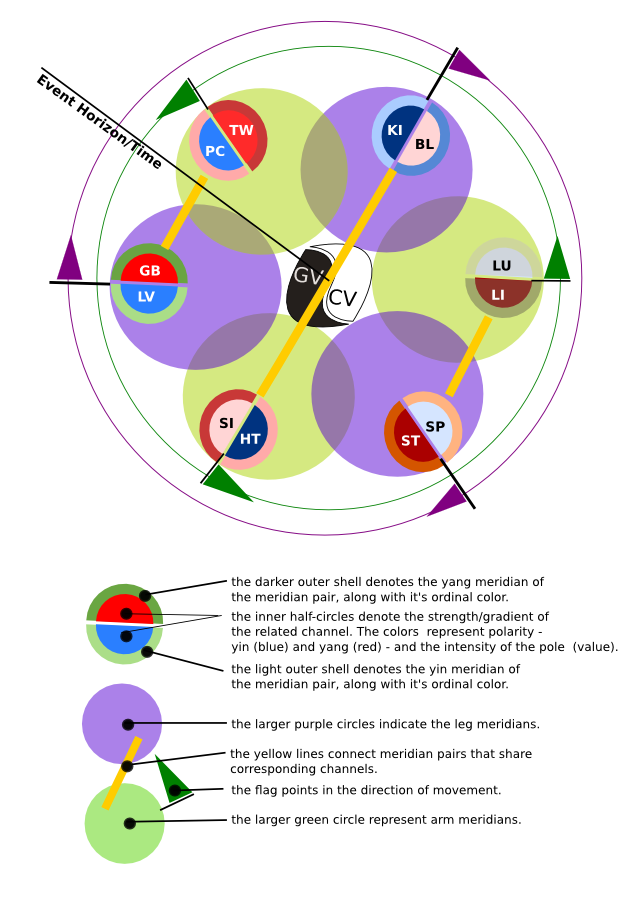
The legend beneath the main diagram helps explain what's happening there. But something about it was still unclear to me – namely how the channels moved.
In response to that sense of not seeing it completely, I created the moving diagram below.

The old paradigm meridians are all represented by moving semicircular bars of color that pass through the 'event horizon' (the small white 'x' below the red 'x'), and the meridians themselves are symbolized by the moving balls of different colors (relating to the color of the 'Element' each is represented by).
In the diagram, the channels are represented as orange, purple and green lines. The red 'x' represents the axis of the channel movements while (as mentioned above) the smaller white 'x' represents the time event horizon. When meridians that share channels pass directly 'over' one another, little explosions happen. This is in part to illustrate the 'pole shift' as two meridian pairs move over one another in space and around the Governing and Conception vessel commutators. You'll notice this is in part illustrated by the change in the shade of orange, green and purple when they cross over this mark on either side of the axis. It is also interesting to note that the axis of the flow of channels is 15 degrees down from the time event horizon. Although not very well illustrated in this version of the diagram, this seems to be built into the geometry of the phenomenon.
Questions/Comment: ana [at] jellobrain [dot] com
Bonus Images Comparing Diurnal Meridians
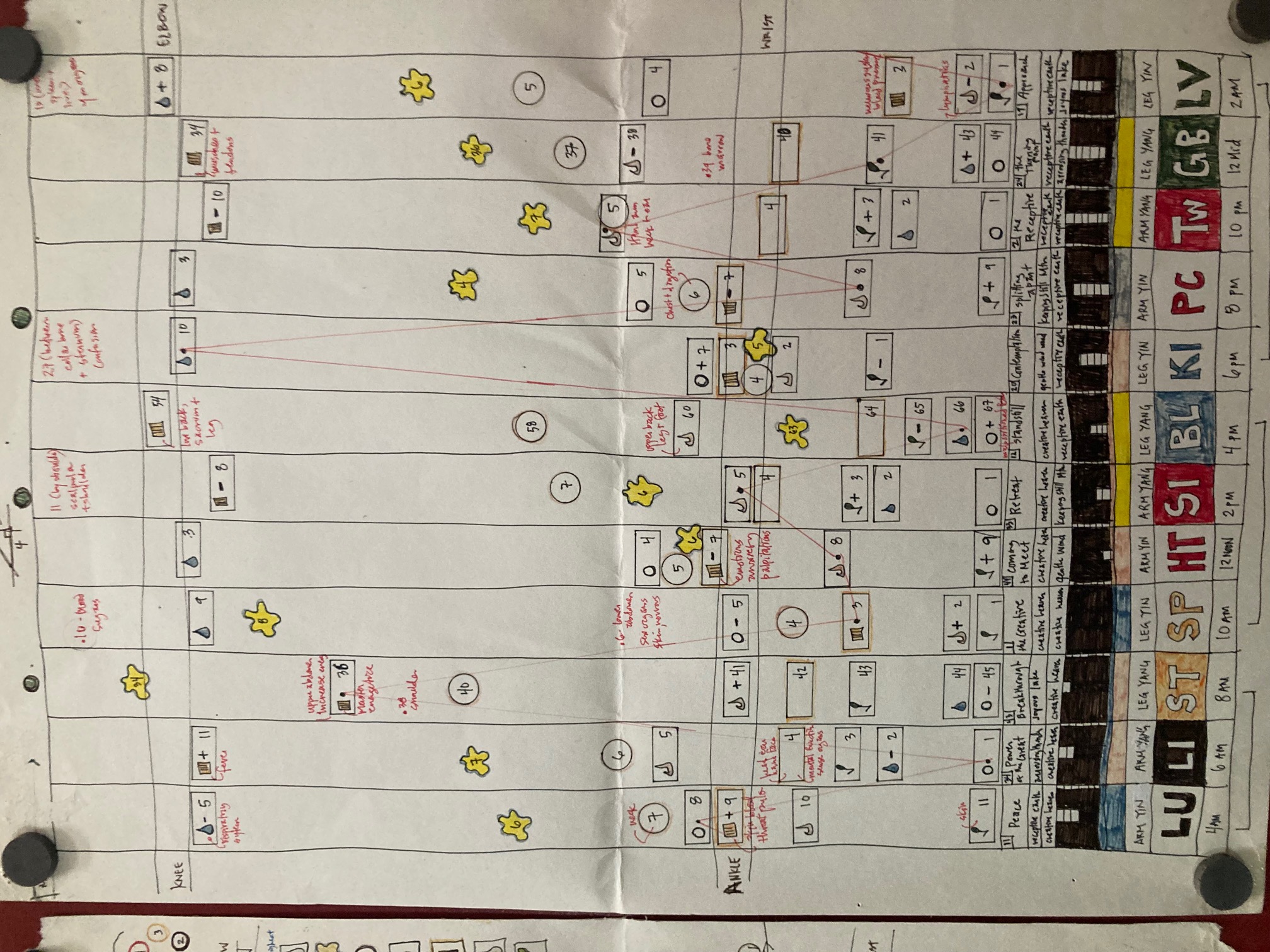
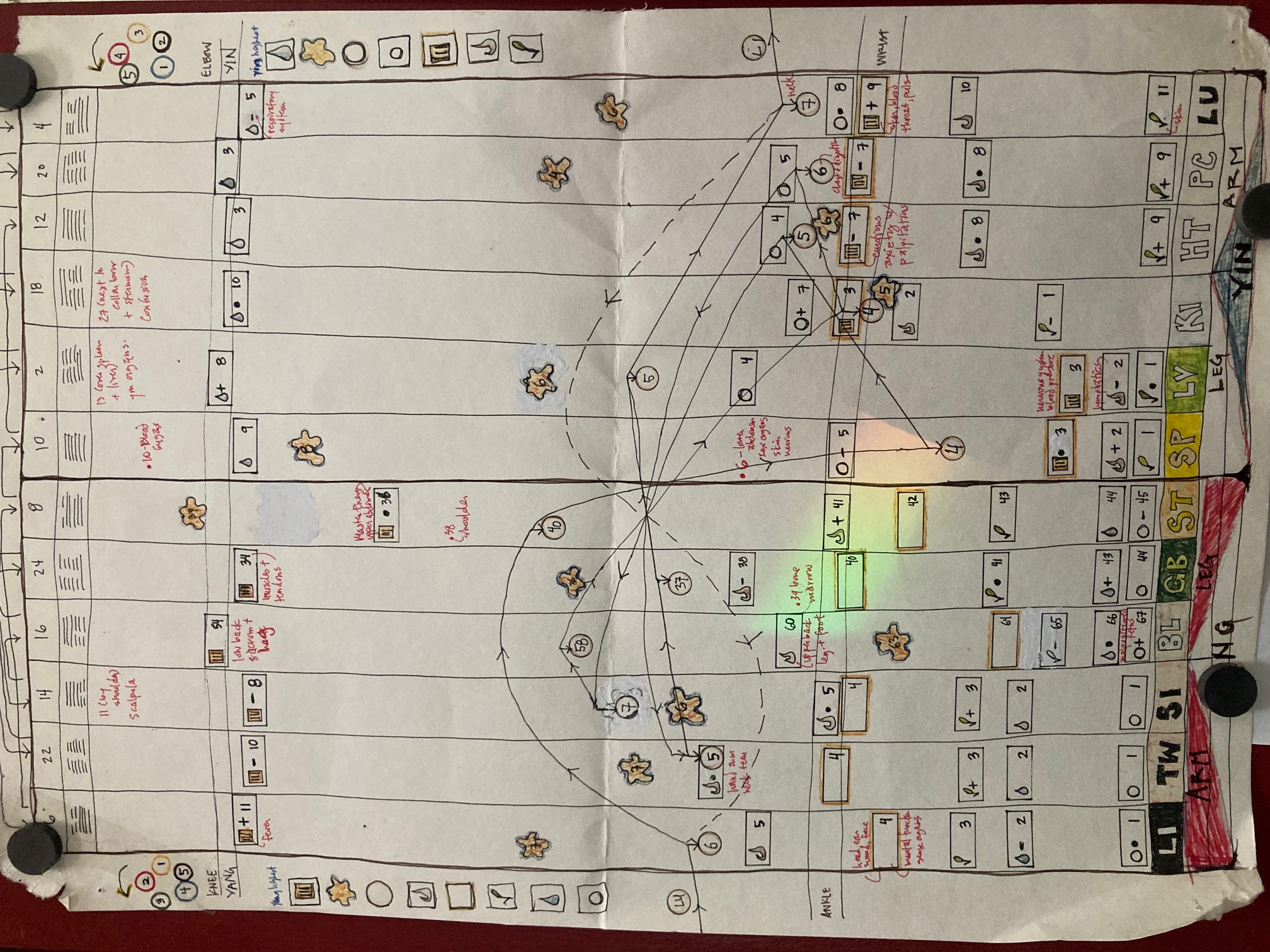
![]()
Open Letter to Nassim Haramein by Ana Willem is licensed under a Creative Commons Attribution-NonCommercial-ShareAlike 4.0 International License.
Based on a work at http://jellobrain.com.
